
In today's competitive business environment, effective collaboration and streamlined knowledge management are crucial to staying ahead of the curve. Enter the world of Wiki software – a powerful solution designed to boost teamwork and facilitate easy access to vital information. Welcome to our comprehensive blog post, where we will explore the top Wiki platforms tailored to meet the needs of modern professionals and organizations.
As we journey through the diverse landscape of Wiki software, we'll provide you with a meticulously curated list of the best options available, highlighting their unique features and benefits. Our objective is to equip you with the knowledge and guidance necessary to make an informed decision on the ideal Wiki platform to use for your knowledge management software stack.
Whether you're a business leader, a project manager, or a team member seeking to enhance collaborative efforts, this blog post will serve as your go-to resource to uncovering the optimal Wiki platform for your needs.
Feel free to explore by clicking on any of the following links:
- Benefits of using wiki software
- Best wiki software for 2024
- Essential features to look for when selecting wiki software
- FAQ
Why Should Your Team Use a Wiki Tool?
Before we dive in, let's address the critical question: Why should your team create an internal wiki? Here are several compelling benefits of utilizing wiki software for your business:
1. Promote Best Practices and Alignment
A wiki serves as a central repository for your team's documented standard operating procedures, best practices, and collective knowledge. This ensures team members consistently operate with these best practices in mind and can always refer to the relevant documents as needed.
2. Improve Employee Onboarding and Training
An internal wiki is an invaluable resource for onboarding and training employees. By integrating your wiki into your training sessions, you can reinforce lessons, effectively communicate tacit knowledge, and provide critical information. Employees will have access to a comprehensive library of resources, promoting continuous improvement of their knowledge and skills.
3. Facilitate Self-Service Options for Customers
The public-facing side of your wiki can act as a self-service portal, meeting the expectations of modern consumers. This not only improves the customer experience but also frees up time for your service and support staff to address more pressing issues.
4. Preserve Employee Knowledge
Practically speaking, your wiki tool will allow you to retain team knowledge well into the future — even as employees retire or otherwise churn.
This will save you countless hours while getting new employees onboard and up to speed. Similarly, it makes it easy for your long-time employees to fill in the gaps left by their former colleagues.
In any case, documenting your collective knowledge ensures you never lose the valuable pieces of wisdom behind your team’s success, no matter who comes and goes within your company.
5. Cultivate a Knowledge-Centered Culture
Your wiki will ultimately play a key role in bringing knowledge and knowledge management to the center of your organization.
As your team grows more accustomed to using and building on your wiki, they’ll begin to realize the positive impacts knowledge sharing has on their individual and team performance. Ideally, this will open the door for more knowledge-focused initiatives (such as communities of practice and further employee training).
6. Streamline Collaboration and Communication
A wiki tool fosters efficient collaboration and communication among team members. By centralizing information and providing an accessible platform for updates and discussion, a wiki minimizes the risk of miscommunication and fosters a more unified approach to tackling projects and tasks. This leads to increased productivity and overall team cohesion.
16 Best Wiki Software for Businesses in 2024
Now that we have a clear idea of why you may want to consider wikis for your business, let’s take a look at the best wiki software options available in 2024.
1. Confluence
Atlassian’s Confluence gives teams a dedicated workspace where they can collaboratively create, edit, and share documents with one another in a wiki format.
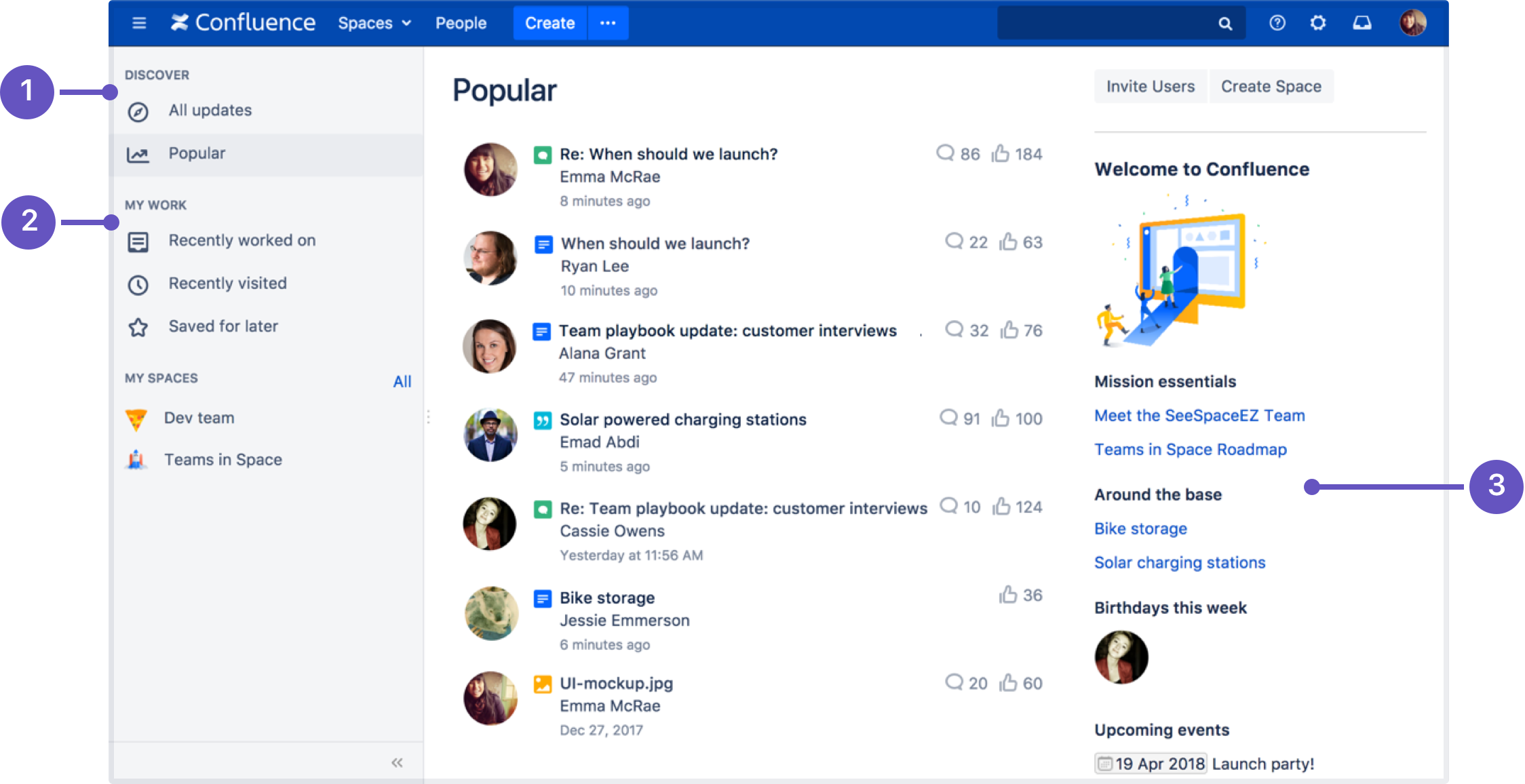
Confluence offers over 75 content templates, along with a drag-and-drop interface for easy content creation. The tool’s social and chat features help make knowledge capture and sharing a normal part of your team’s processes — protecting against knowledge loss at all turns.
Confluence integrates with all other tools in Atlassian’s suite, and with over 3,000 third-party apps.
Confluence Pros
- Customizable for various purposes and use cases
- Collaborative features
- Template variety
Confluence Cons
- Interface may be too complex for non tech-savvy users
- Some navigability issues
Confluence Pricing
- Free for up to 10 users and 2GB of storage
- Premium tiers start at $55/month per user, for up to 20k users and 250GB of storage
2. MediaWiki
MediaWiki is the software behind Wikipedia — and the internal wikis of thousands of other businesses and organizations.
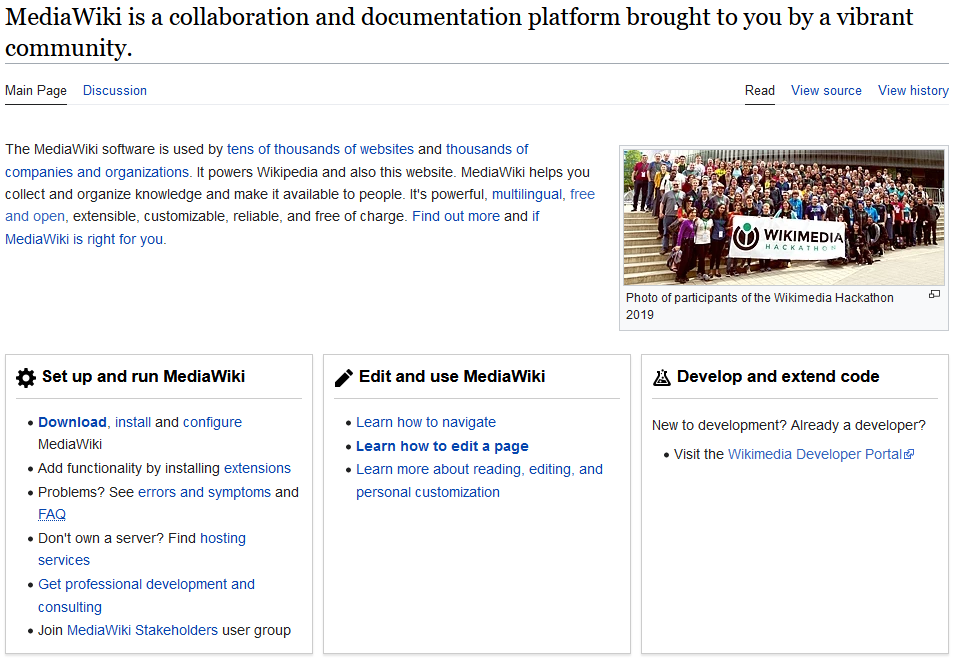
It’s a simple and reliable tool for creating content, hosting files, and developing a customized wiki space for your team. Interlinking is intuitive, in turn leading to a seamless and contextual content journey for the end-user.
MediaWiki connects with over 1,500 extensions to enhance the experience for creators and users alike.
MediaWiki Pros
- Quick setup and user onboarding
- Feature-rich and scalable
- Community resources and support
MediaWiki Cons
- Dated interface
- Infrequent updates
MediaWiki Pricing
- MediaWiki is an open-source wiki tool
3. Nuclino
Nuclino’s wiki software offers a unified workspace where teams can collaborate in real-time while creating knowledge content.
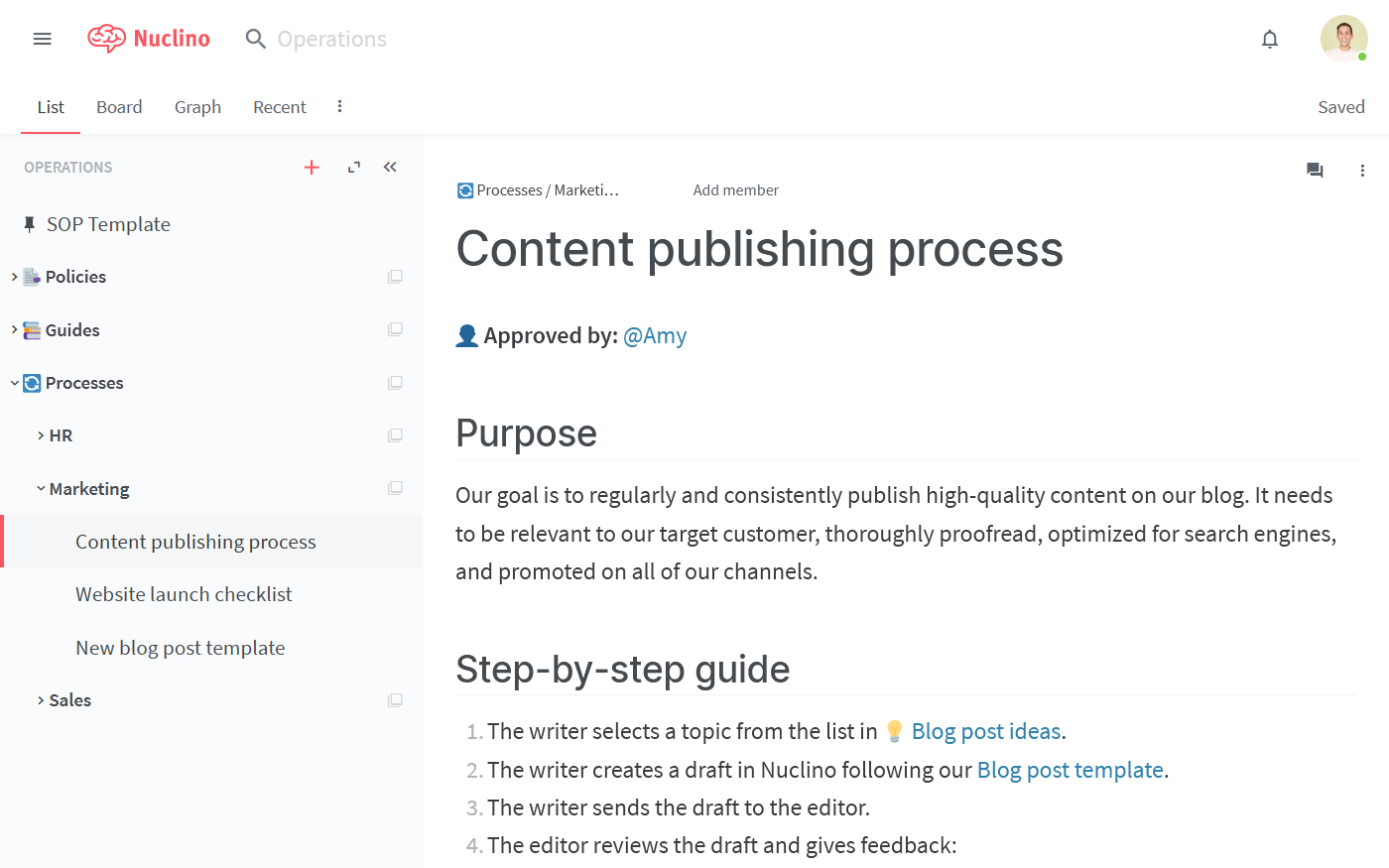
The WYSIWYG, Markdown-enabled editor makes for quick onboarding and a simple content creation process. Code blocks allow for further content customization, while multimedia support lets teams easily communicate important information in multiple ways.
With Nuclino, teams can visualize the structure of their wiki as “clusters” — making organization and ongoing maintenance as intuitive as possible. This, combined with document tagging and interlinking features, also make for intuitive navigation of your wiki content for the end-user.
Nuclino Pros
- Easy-to-use interface and features
- Integrations with Slack, Google, and others are seamless
- Comprehensive solution that can replace multiple tools
Nuclino Cons
- Privacy and permission control options lacking
- Fewer integrations than other tools on the list
Nuclino Pricing
- Free for up to 50 items and 2GB of storage
- Standard: $5/month per user for full service
4. Notion
Notion is an “all-in-one workspace” for both remote and on-premise teams.

Notion focuses heavily on real-time knowledge capture, allowing teams to quickly create wiki pages using notes, messages, and other documents. With over 50 templates to choose from and a drag-and-drop editor, putting together new wiki content is quick and easy regardless of the context.
Permissions can be set within Notion based on specific pages, or on content hierarchy. Versioning also protects against accidental content edits or erasures.
Notion Pros
- Simple and efficient user interface
- Customizable and flexible for multiple purposes
- Excellent tech support and community resources
Notion Cons
- Lack of automation for common tasks
- Poor search functionality
Notion Pricing
- Free for up to 5 guests
- Team: $8/month per user for unlimited team members and collaborative spaces
5. Guru
Guru is the wiki tool of choice for a number of SaaS companies, agencies, and educational organizations.
 Like Notion, Guru is heavy on knowledge capture and storage. The tool’s browser extension, for one, allows teams to capture information and data from around the web — then inject it directly into their wiki accordingly. Guru’s advanced AI notifies stakeholders of events in real-time, and delivers reminders to knowledge content creators as needed.
Like Notion, Guru is heavy on knowledge capture and storage. The tool’s browser extension, for one, allows teams to capture information and data from around the web — then inject it directly into their wiki accordingly. Guru’s advanced AI notifies stakeholders of events in real-time, and delivers reminders to knowledge content creators as needed.
Finally, Guru’s expert verification and suggestion features help teams source the right info from the right individual within the company. That way, the knowledge content they create will always be as accurate and informative as possible.
(Note. For teams that feel like they like a lot of Guru's features but that it's not quite the right fit, check out our comprehensive guide on Guru alternatives for more information.)
Guru Pros
- Intuitive interface and workflows
- Advanced search functions
- Interactive wiki content (e.g., quizzes)
Guru Cons
- Documents can easily become disorganized
- Customization options lacking
Guru Pricing
- Starter: Free up to 3 users; $5/month per user for 4+
- Builder: $10/month per user
- Expert: $20/month per user
6. ProProfs
ProProfs tool allows teams of all sizes to create user-friendly wikis for both internal and customer-facing use.
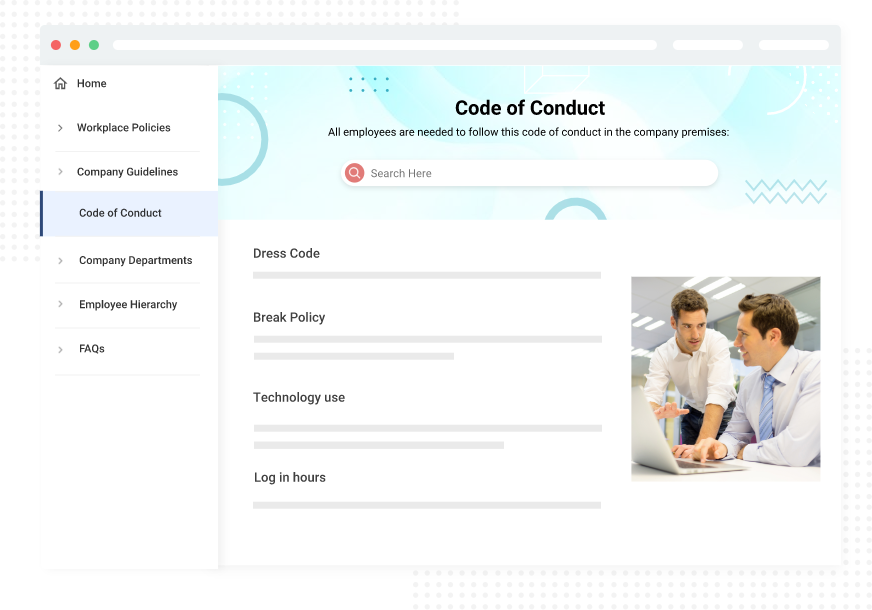
It’s a highly-customizable solution, across the board: Teams can tweak ProProfs’ interface to suit their needs — and customize their wiki’s structure and appearance, too. ProProfs lets teams inject their own branded look and feel throughout their wiki, making for a streamlined experience for the user.
ProProfs’ unified search functionality combs text and tags to help you quickly find the information you need. Tagging and interlinking content builds context and creates relevant content journeys for users as they browse your wiki.
ProProfs’ wiki tool integrates with the various other tools in their suite, and with dozens of third-party tools, as well.
ProProfs Pros
- Familiar Word-like text editor
- Instant/real-time knowledge-sharing capabilities
- Google-like search
ProProfs Cons
- Some integrations can be buggy
- Not enough variation with provided templates
ProProfs Pricing
- Essentials: $30/month per author for 3 authors, 500 pages, and 1 knowledge base
- Premium: $40/month per author for 3 authors, 1,000 pages, and 3 knowledge bases
7. SlimWiki
SlimWiki is a simple wiki-building tool for budget-conscious organizations.

Its simplicity makes it a key choice for less tech-savvy teams who need a no-frills digital space to store team knowledge. Editors can drag-and-drop text, multimedia, and other files into documents with ease — and can customize page appearance should they choose to do so.
SlimWiki integrates with HipChat and Slack so teams can communicate and collaborate directly within the tool. Changes to wiki content are saved and backed up automatically, with teams being able to revert to past versions with ease.
SlimWiki Pros
- WYSIWYG interface
- Slack integration empowers search queries
- Cost-effective solution
SlimWiki Cons
- Likely too simple of a solution for growing businesses
SlimWiki Pricing
- Free for 1GB storage
- $20/month for 3 users
- $50/month for 10 users
- (Pricing scales from there)
8. Zoho Wiki
Zoho Wiki gives your team a collaborative workspace to create wiki-style knowledge base content.
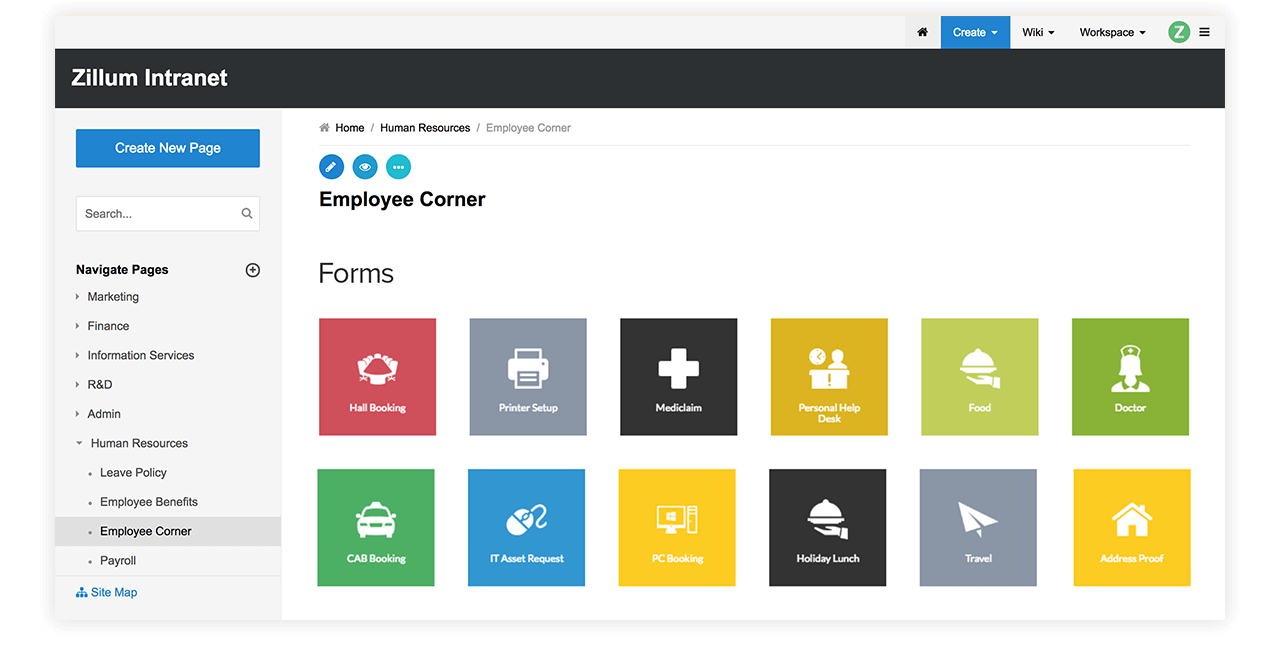
With Zoho Wiki, teams can inject a wide variety of multimedia and other content into their wiki articles. Integrations with apps like Twitter, Google Maps, and Google Translate let you go above and beyond here — injection highly relevant and helpful resources into your wiki content.
Zoho Wiki automatically notifies team members when wiki content is changed or otherwise requires attention. Secure permission options keep knowledge content secure when being interacted with or being stored.
Zoho Wiki Pros
- Live chat feature for creators
- Supports real-time collaboration
- Scalable and customizable to various needs
Zoho Wiki Cons
- Setup not intuitive
- Free version offers limited features
Zoho Wiki Pricing
- Free for up to 3 users
- $2.70/month per user for 1 wiki and 1GB storage
- ($54 a la carte fee per additional wiki)
9. DokuWiki
DokuWiki is a versatile open-source wiki solution used to create everything from corporate knowledge bases and company wikis to team workspaces and private notebooks.
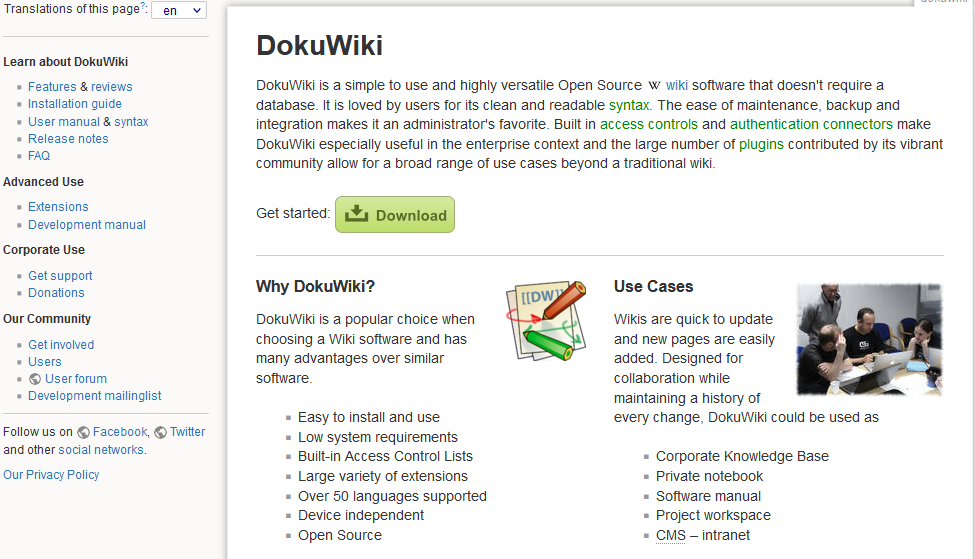
As an open-source tool, DokuWiki can be whatever your team needs it to be. While the main tool is simple and straightforward enough for less tech-savvy teams, more advanced teams have full rein to tailor the tool to their liking. DokuWiki’s community continually releases new software updates, add-ons, and other improvements for teams to take advantage of.
Similarly, DokuWiki’s list of community resources is ever-growing, as well. Regardless of how you intend to use DokuWiki, you’ll have clear guidance on how to make the most of it.
DokuWiki Pros
- Easy installation, setup, and onboarding
- Device-independent
- Improved administrative and authentication features
DokuWiki Cons
- Too “bare bones” for some teams
- Some ongoing security concerns
DokuWiki Pricing
- DokuWiki is an open-source wiki tool
10. Slab
Slab allows teams to create wiki-style knowledge bases that will foster a culture of knowledge-sharing throughout their organization.
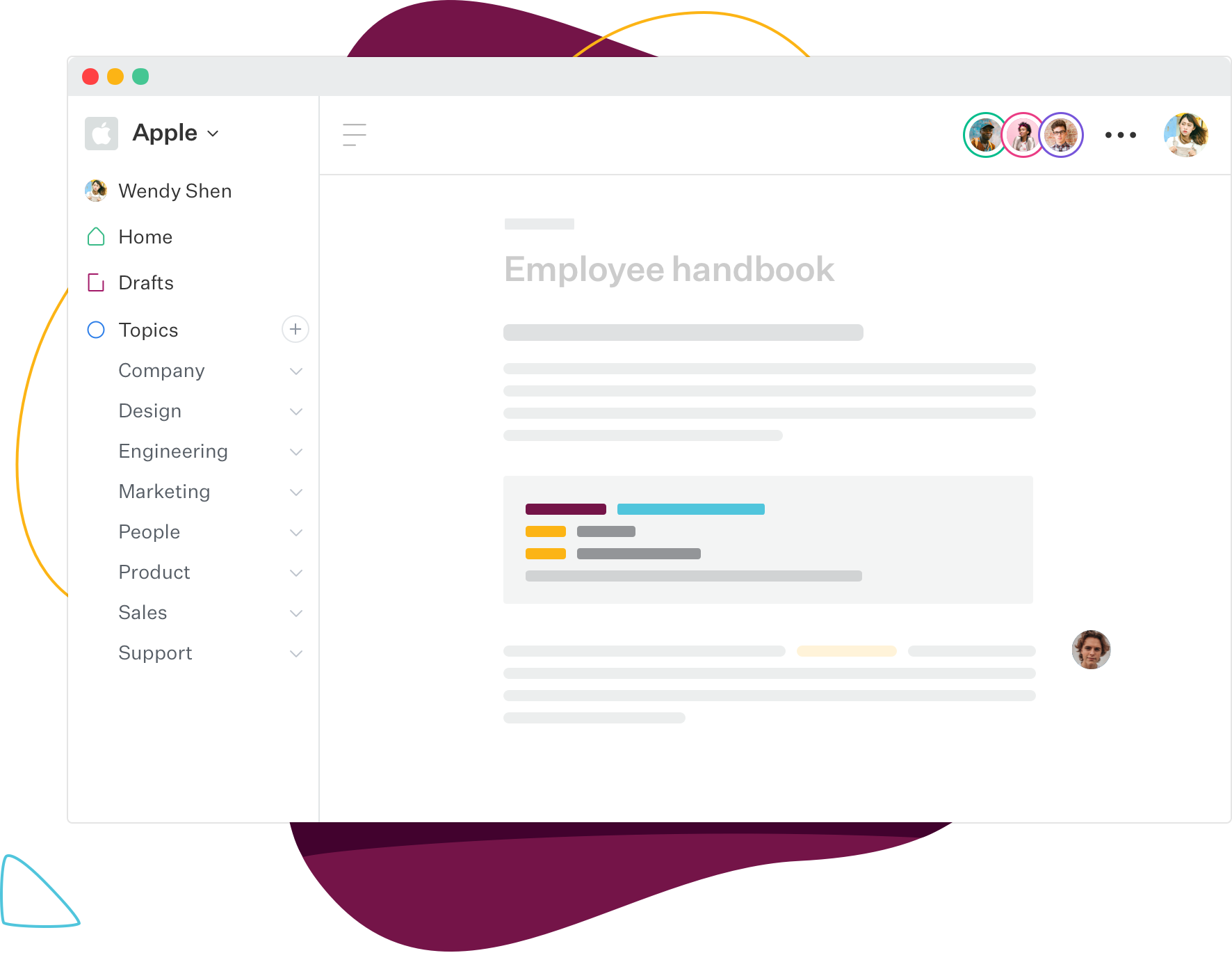
Teams can collaborate in real-time via Slab’s intuitive interface, which offers a mix of traditional and modern features — along with a crisp, modern look and feel. Building content hierarchies (and keeping them organized) is just as intuitive.
Slab integrates with dozens of third-party tools, such as Monday, Trello, and Zendesk — and allows teams to search these platforms for data and info directly within Slab’s interface.
Slab Pros
- Dozens of templates for multiple purposes and content types
- Simplified change tracking and versioning
- Streamlined and engaging onboarding
Slab Cons
- Limitations with interlinking
- Permission options recently improved but still lacking
Slab Pricing
- Free for up to 10 users and 10MB attachments
- Startup: $6.67/month per user for unlimited users and 25MB attachments
- Business: $12.50/month per user for unlimited users and 100MB attachments
11. XWiki
XWiki is another open-source solution that’s continuously being improved upon by a community of over 100 developers — all for the purpose of helping teams break down information silos and maintain alignment.
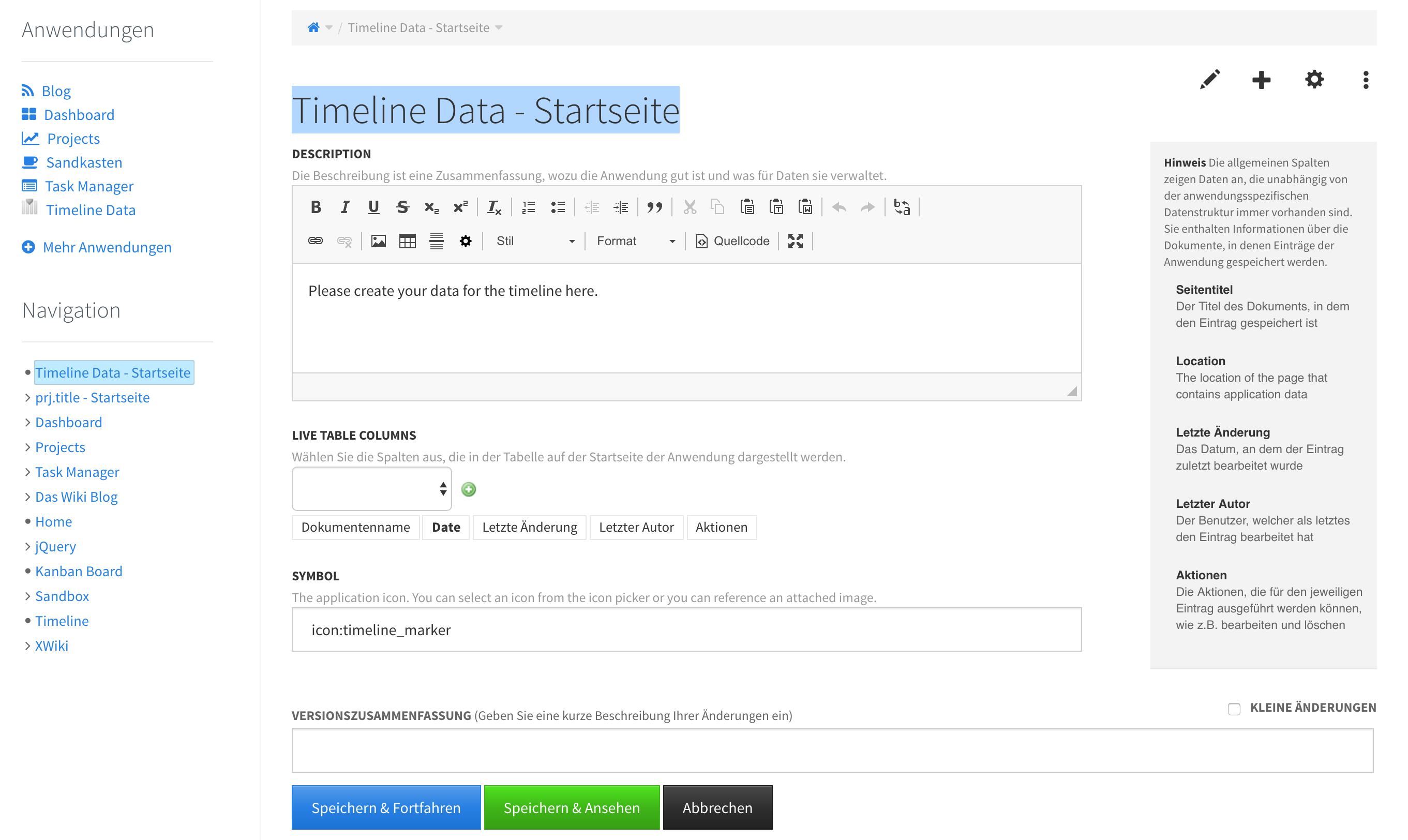
As an out-of-the-box solution, XWiki provides the core features of an open-source wiki tool, including:
- A WYSIWYG interface
- Intuitive content structuring and navigation
- User permission and rights management
Teams can supercharge their use of XWiki with over 800 extensions — all readily available via XWiki’s community resources. XWiki’s developer community is dedicated to the security of their software, providing multiple layers to ensure their users' data remains safe at all times.
XWiki Pros
- A simple but scalable wiki solution
- Advanced search and navigation features
- Continual updates, improvements, and additions
XWiki Cons
- Basic UI perhaps too basic for some
- Slowdowns and technical glitches
XWiki Pricing
- XWiki is an open-source wiki software solution
12. Kipwise
Kipwise aims to help streamline knowledge sharing for remote and on-premise teams via automation and AI-powered technology.
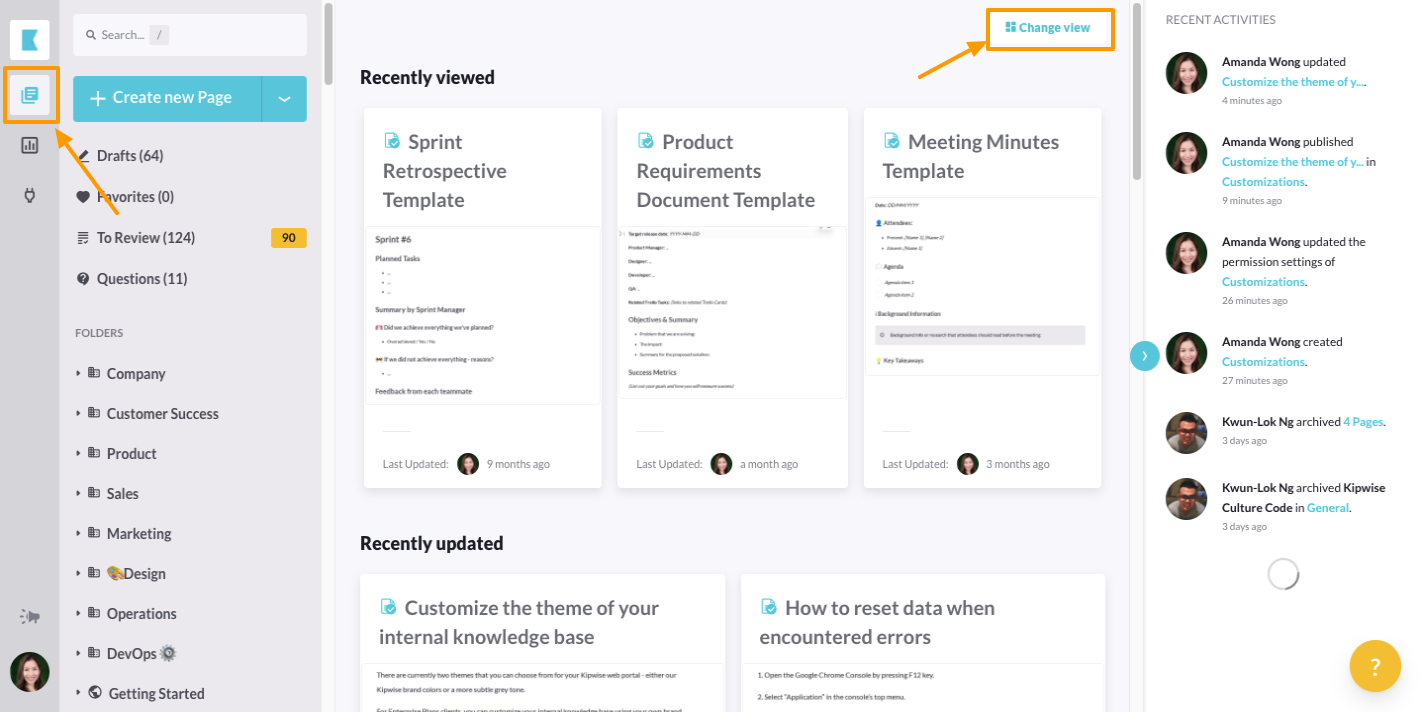
With Kipwise, teams can easily develop workflows for knowledge creation and management. From there, they can collaborate in real-time to create engaging and attractive wiki content for their end-user. Teams can search past conversations within Kipwise and integrated apps to easily capture and record knowledge within their wiki pages.
AI powers a number of Kipwise’s features for both knowledge creators and consumers — from timely reminders and alerts, to dynamic search and content suggestions, and more.
Kipwise Pros
- Intuitive workflows and knowledge structuring
- Practical and effective automations
- Seamless integration with dozens of tools
Kipwise Cons
- Wiki can become disorganized easily
- Search function not optimized
Kipwise Pricing
- Professional: $4.25/month per user
- Premium: $7.65/month per user
13. Wiki.js
Wiki.js is hailed as the “most powerful and extensible” open-source wiki tool available.

It’s a fully customizable tool, boasting numerous advanced features that can easily be turned on or off. Customizable themes, along with HTML/CSS support, allow teams to make their wiki their own — both internally and for the user.
Wiki management and maintenance is a key focus for Wiki.js. Comprehensive administrative features give you full control over your knowledge content — and over who can access and edit your wiki pages.
Wiki.js Pros
- Powered by Node.js for high performance and functionality
- Multi-device support with real-time authentication and syncing
- A resource-rich community
Wiki.js Cons
- Requires a separate database
Wiki.js Pricing
- Wiki.js is an open-source wiki solution
14. Slite
Slite’s innovative approach to collaborative workspaces helps teams create engaging and informative wikis for their end-users.
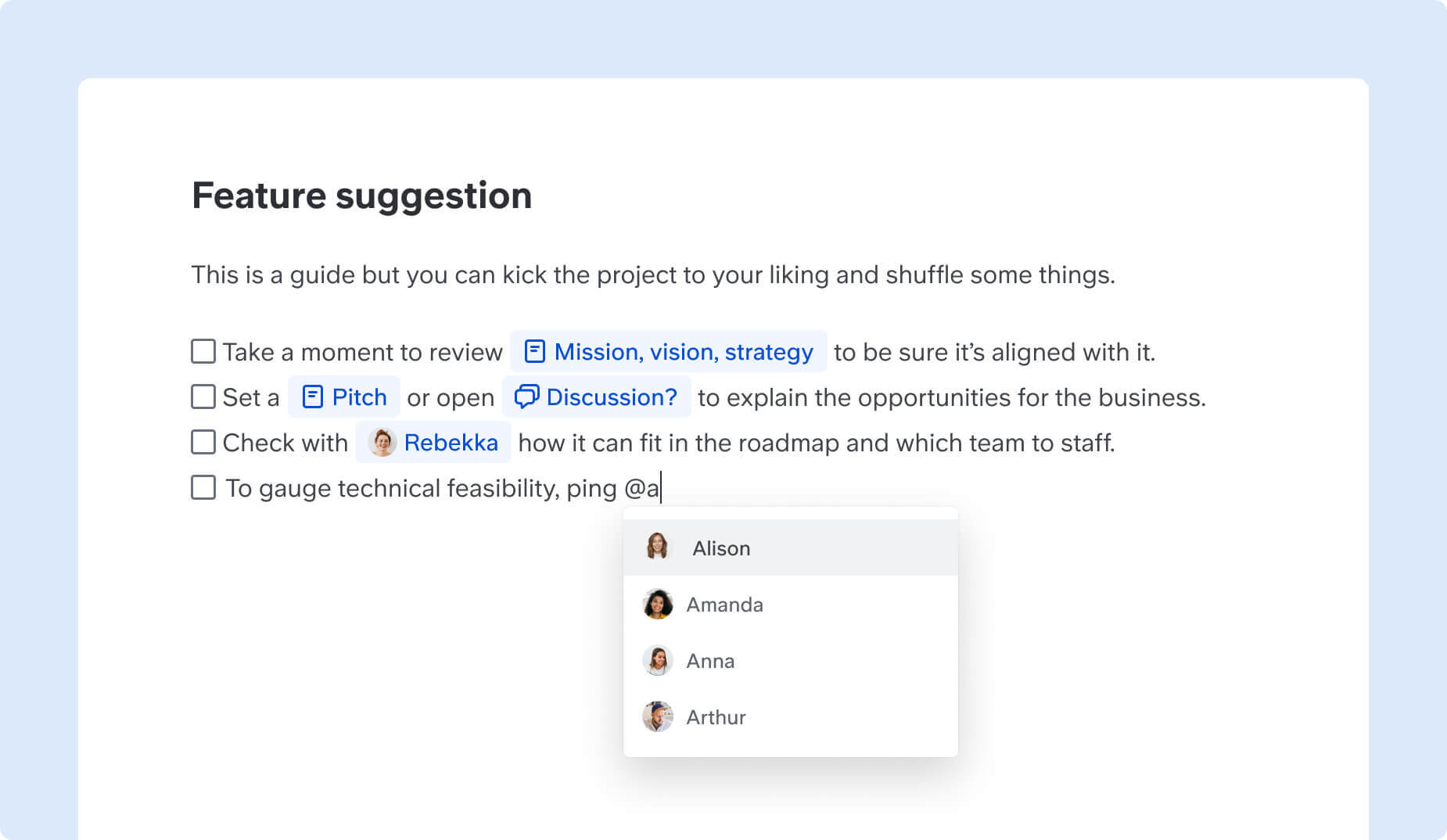
Using Slite’s drag-and-drop editor, teams can bring text and other knowledge assets directly into their wiki pages with ease. Slite also supports Markdown, and allows in-line comments and annotations. Teammates can tag each other within their knowledge documents to gather insight, hand tasks off, and otherwise maintain alignment.
Slite’s Discussions takes all this even further, enabling real-time and asynchronous messaging directly within workspaces. Teams can then easily organize and store this information for safekeeping — and refer back to it as needed moving forward.
Slite Pros
- UI structure and navigability
- Knowledge capture features
- Excellent customer service
Slite Cons
- Some permission control issues
- Poor mobile accessibility
Slite Pricing
- Free for up to 50 documents and discussions
- Standard: $6.67/month per user
- Premium: $12.50/month per user
15. Tettra
Tettra’s wiki software helps teams supercharge their overall knowledge management initiatives — and bring organizational knowledge to the forefront of all team processes.
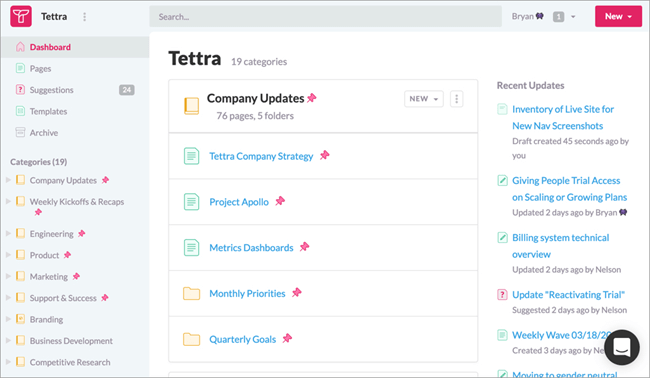
With Tettra, teams can easily create and edit knowledge content — and just as easily keep it organized and accessible for all stakeholders. Tettra’s Q&A feature allows knowledge content to be pushed to Slack and Microsoft Teams chats when prompted by users.
Tettra also helps teams identify knowledge gaps, structural problems, and other knowledge-related issues requiring immediate attention. This, along with usage reports and analyses, will help you make laser-focused improvements to your wiki over time.
Tettra Pros
- User-friendly for technical and non-technical teams
- Seamless integrations
- Provider dedicated to continuous improvement
Tettra Cons
- No real-time collaborative editing
- Lack of direct integrations (most through Zapier)
Tettra Pricing
- Free for 10 users, 1GB per user
- Scaling: $8.33/month per user for up to 250 users and unlimited storage
- Enterprise: $16.66/month per user for unlimited everything
16. Gitbook
Gitbook is a wiki tool designed to help software teams break down organizational silos.
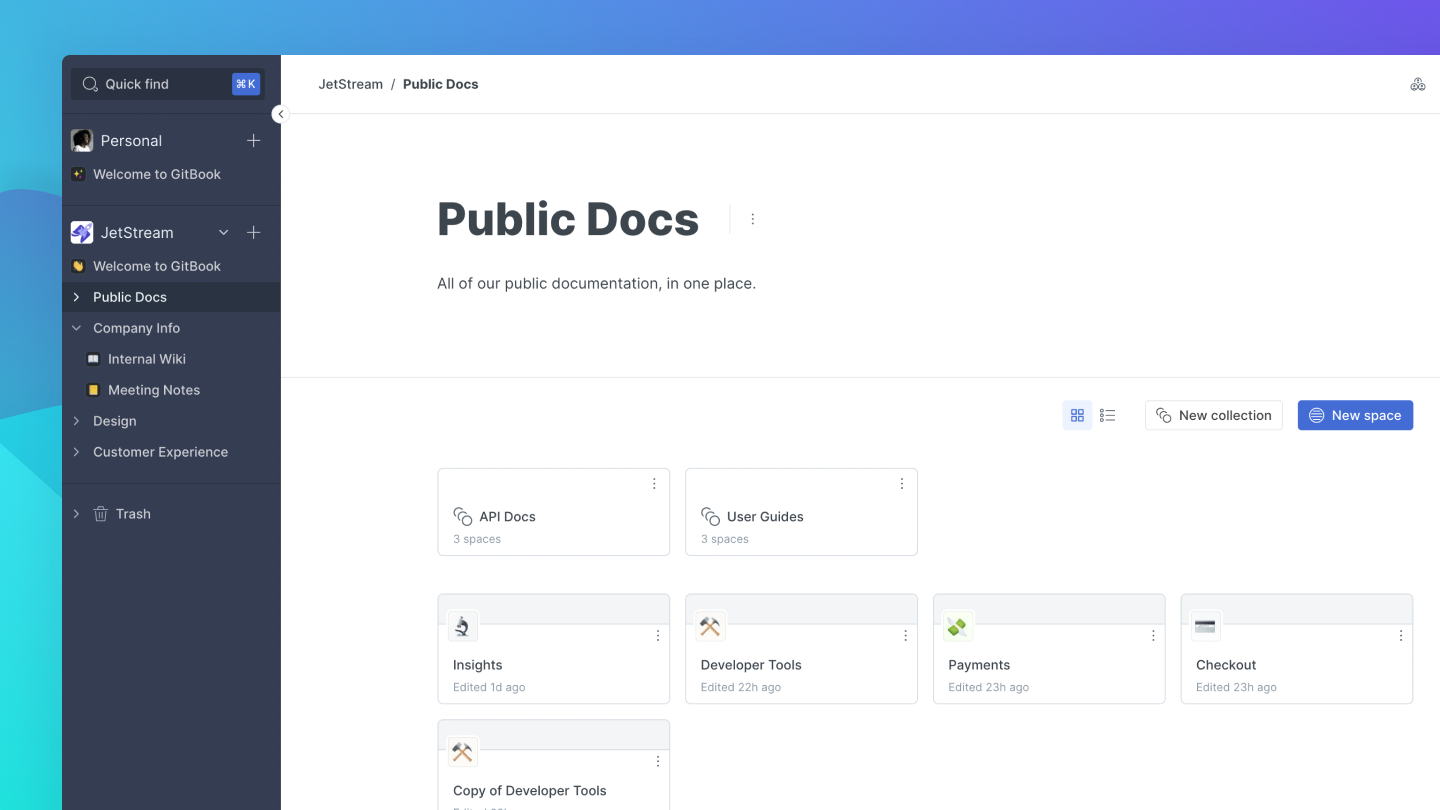
While no coding or design expertise is needed to create in Gitbook, the tool also lets teams use Markdown editing, code snippets, and rich embeds within their knowledge docs. Gitbook stays focused on documentation over aesthetics and over-the-top features — making it a prime choice for software and development teams.
(Advanced branding options are available — but don’t detract from the tool’s main focus on documentation.)
Gitbook allows for synchronous and asynchronous collaboration and provides versioning controls to help you keep all software documentation organized, accurate, and up-to-date.
Gitbook Pros
- Syncs with GitHub and GitLab
- Simple, flexible interface
- Community development and engagement
Gitbook Cons
- Lack of full customization options
- Password-less login not ideal
Gitbook Pricing
- Free for open-source projects
- Team: $6.40/month per user, starting at 5 users
- Business: $12/month per user, starting at 20 users
- Enterprise option available
Essential Features Wiki Software Should Offer
When choosing the right wiki tool for your organization, it's crucial to consider the key features that cater to your specific needs. Here, we discuss the main features your tool should include, along with some advanced functionalities offered by various wiki software.
Collaborative Editing
At the heart of any wiki tool is collaborative editing. Your chosen software should enable all relevant team members to create, edit, and optimize wiki content, either in real-time or asynchronously. Many tools also provide annotation and commenting capabilities for both in-progress and published content.

Content Management
Efficient content management is vital when deciding on the best wiki software for your needs. Look for wiki solutions that allow you to:
- Build content structures and hierarchies
- Interlink related and relevant content
- Easily navigate your content library (for users and editors)
Some wiki tools offer automation features for content scheduling and reminders for content updates or audits. Versioning is also essential for maintaining accuracy and optimization.
Customization & Brandability
From both a functional and aesthetic perspective, you’ll want to be able to customize your wiki solution to your needs.
In terms of functionality, the tool should provide the flexibility needed…
- For your team to effectively and efficiently develop your wiki content
- For your end-user to get full value from your wiki content
Aesthetically speaking, you want to be able to customize your wiki’s appearance to your team’s liking. For customer-facing wikis, brandability is always important. Internally, customization can help you keep your wiki from feeling dated or obsolete.
Intelligent Search
An intelligent search function is essential — especially as your content library continues to expand.
At the very least, your wiki tool’s search function should return relevant results with minimal errors. Ideally, it allows for Google-like commands, along with dynamic form completion and search suggestions.
The best wiki tools should have search engine optimization features, as well. This all but ensures your users will be able to find exactly what they’re looking for whenever they engage with your wiki.
Multimedia and Multi-Format Support
Choose a wiki tool that supports various media types, such as images, videos, and audio files. Consider options that allow end-users to download wiki content or specific assets.

Mobile and Offline Access
Your wiki tool should be accessible across multiple devices and offer offline access to recently visited and highly trafficked pages. Some providers offer varying degrees of offline/async editing functionality.
Integrations and Add-Ons
Both integrations and add-ons are essential parts of your future wiki tool.
For one, the tool should integrate seamlessly with the current tools in your tech stack — and, ideally, any tools you add to it in the future. As you’ll see, most tools typically integrate with various chat tools, help desks, CRM software, and more.
Many providers also offer add-ons or plug-ins — whether developed in-house or by members of the community. Some wiki tools provide hundreds of plug-ins to help you supercharge your internal efforts and user experience.
Usage Records and Reports
Managers and administrators should have full visibility of how the wiki is being used, and how it’s evolved over time.
Usage reports are important to identify commonly-visited pages and content. This, in turn, can inform a variety of initiatives — from product development and content creation to customer service and support.

Wiki tools should also keep records of any changes made to your content or content structure. The ability to revert to previous content versions is essential to avoid data loss and other disasters.
Version Control
Wiki software should maintain records of content changes and offer the option to revert to previous versions when necessary. This is crucial for avoiding data loss and other issues.
Security Features
Ensure your chosen wiki tool offers robust security features to protect against hackers, data leaks, and other threats. Depending on your organization's requirements, you may also need permission restrictions and other privacy features to control access and editing capabilities.
Wiki Tools and Knowledge Management Systems
We said earlier that a company wiki is usually a core part of a team’s overall knowledge management initiative.
But, the fact is, most wiki tools will only take your knowledge management efforts so far. While you certainly can use these tools to take things to the next level, they aren’t your only option — and likely aren’t the best one, either.
If you're looking to fully optimize your organization's knowledge sharing and collaborative efforts then you may want to make use of knowledge base software.
Helpjuice’s knowledge base software provides the functionality and customization of most wiki tools — along with advanced features that allow your team to create, manage, and access company knowledge with ease.
Ready to get started? Try Helpjuice today with a 14-day free trial (no credit card required)!
Frequently Asked Questions
Here are a few commonly asked questions regarding wiki software.
1. What is Wiki Software?
2. What Does Wiki Software Do?
Wiki software serves as a collaborative platform for creating and managing a comprehensive knowledge base. It allows multiple users to contribute to and edit content, providing a dynamic, evolving resource for information sharing.
3. What Type of Content is Typically Found in an Internal Wiki?
An internal wiki, also known as a corporate wiki or enterprise wiki, is designed for use within an organization or team, and typically contains content related to the organization's operations, projects, and knowledge sharing. Common types of content found in an internal wiki include:
- Process documentation: Standard operating procedures (SOPs), workflow docmentation, and other comprehensive guides outlining the organization's established methods, practices, and steps for completing tasks, processes, and workflows, ensuring consistency and efficiency across the team.
- Best practices and guidelines: Recommended practices, tips, and approaches for achieving optimal performance and results.
- Project documentation: Information related to ongoing or completed projects, such as project plans, status updates, and lessons learned.
- Training materials: Resources to support employee training and development, such as onboarding guides, tutorials, and e-learning modules.
- Company policies and procedures: Official rules, regulations, and protocols governing various aspects of the organization, such as human resources, IT, and compliance.
- Product and service information: Technical documents, user guides, and troubleshooting resources for the organization's products and services.
- Meeting notes and agendas: Records of past meetings, upcoming meeting agendas, and other relevant information for team collaboration and communication.
- Employee directories and profiles: Contact information and brief profiles of team members, including their roles, responsibilities, and areas of expertise.

![Internal Wiki Guide: How to Create One + Best Software to Use [2023]](https://s3.amazonaws.com/helpjuice-static/helpjuice_production%2Fuploads%2Fupload%2Fimage%2F4752%2Fdirect%2F1609788064037-Internal+Wiki.jpg)




